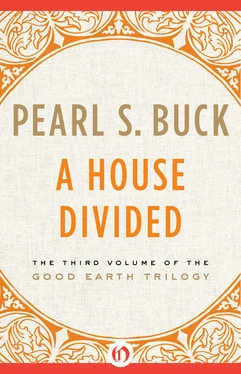At last he could think of nothing else than pouring out his need before her. So steadily did he know that she would help him, that when his mother came at last, he could greet her as he should and look upon her without suffering to think she was his mother and yet one to whom he had nothing to say. For she was now, for all her withered rosy healthy looks, a very plain old country woman. She looked up at him, leaning on a peeled staff she used these days to walk with, and her old eyes asked, wondering, “What is this I have for a son?”
And Yuan, tall and different in the foreign clothes he wore, looked down upon the woman in her old-fashioned coat and skirt of black cotton stuff and asked himself, “Was I indeed shaped in this old woman’s body? I feel no kinship in our flesh.”
But he did not suffer or now feel ashamed. To that white woman, had he loved her, he would have said with great shame, “This is my mother.” But he could say to Mei-ling, “This is my mother,” and she, knowing that a thousand men like him had sprung from such mothers, would not think it strange, for nothing was strange to her. To her it would be enough that it was so. … Even to Ai-lan he might feel shame, but not to Mei-ling. He could uncover all his heart to her and never be ashamed. This knowledge made him tranquil therefore, even in his impatience, and later on a certain day he told his mother plainly, “I am betrothed, or good as betrothed. I have chosen the maid.”
And the old woman answered mildly, “Your father told me so. Well, I had talked of a maid or two I knew, but your father has always let you do what you wished. His son you have ever been, and scarcely mine, and he with the hottest temper ever was so I cannot go against him. Aye, that learned one, she could escape it and go out, but I have stayed and let him use me for his anger. But I hope she is a decent maid and can cut a coat and turn a fish as it should be turned, and I hope I may see her sometimes, though I know very well these new times are anyhow, and the young do what they will, and daughters-in-law do not even come to see their husband’s mothers as they ought to do.”
But Yuan thought she seemed glad she need not bestir herself beyond this and she sat and stared at nothing in a way she had and moved her eyes and jaws a little and forgot him, and slept gently, or seemed to do so. They were not of the same world, these two, and that he was her son was meaningless to him. In truth, everything was meaningless to him now, except that he come again into the presence of that one.
When his farewells had been said to his parents, and he forced himself to say them courteously and as though he grieved to leave them, he went again on the train south, and now it was strange how little he saw the travellers on that train. Whether they behaved fittingly or not was all one to him. For he could think of nothing but Mei-ling. He thought of all he knew of her. He remembered that she had a narrow hand, very strong, but narrow across the palm, the fingers very delicate, and then he wondered to think that hand could be swift and stern to cut away an evil growth in human flesh. Her whole body had this slender strength, the strength of good bones well knitted under the fine pale skin. He remembered again and again how able she was in everything and how the servants looked to her, and how Ai-lian had cried out that Mei-ling must say if a coat hung well about the edge, and only Mei-ling could do for the lady what she liked to have done. And Yuan said, comforting himself, “At twenty she is as able as many a woman ten years older.”
For the maid had this double charm for Yuan when he remembered her. She had sedateness and gravity as the older women had, whom he looked to, his lady mother, his aunt, and all those reared in the old ways for rearing maids. And yet she had this new thing, too, that she was not shy and silent before men. She could speak openly and plainly anywhere, and be as easy, in her different way, as Ai-lan was. Thus in the turmoil of the train and while the fields and towns went past, Yuan saw nothing. He only sat and shaped his dreams of Mei-ling, and in his mind he gathered every least word and look of hers and made the precious picture whole. When he remembered all he could, he let his mind leap to the moment when he would see her and how he would speak and what he would tell her of his love. Perfectly as though the hour were there he could see her grave good look, watching him while he spoke. And afterwards — oh, he must remember still how young she was, and that she was no bold, ready maid, but gentle and very reticent. But still he might take that narrow hand of hers, that cool kind narrow hand …
Yet who can shape an hour to his wish, or what lover knows how the hour will find even himself? For Yuan’s tongue, which shaped the words so easily upon the train, could shape nothing when the hour was come. The house was quiet when he came into its hallway, and only a servant stood there. The stillness struck him like a chill.
“Where is she?” he cried to the servant, and then remembering, he said more quietly, “Where is the lady, my mother?”
The servant replied, “They are gone to the foundlings home to see to a babe newly left there who is ill. They may be late, they said.”
So then Yuan could only cool his heart and wait. He waited and tried to turn his thoughts here or there, but his mind was not his own — it would turn back of its own will to the one great hope it had. Night came and still the two did not come, and when the servant called the evening meal, Yuan must go to the dining room and eat there alone, and the food was dry and tasteless on his tongue. Almost he hated the little child who so delayed the hour he had longed for all these weeks.
Then even as he was about to rise because he could not eat, the door opened and the lady came in, very weary and spent and downcast in her look, and Mei-ling with her, silent and sad as Yuan had never seen her. She looked at Yuan as though she did not see him and she cried out to him in a low voice, as though Yuan had not been away at all, “The little baby died. We did all we could, but she died!”
The lady sighed and sat down and said, grieving too, “You are back, my son? … I never saw a lovelier little newborn child, Yuan — left three days since on the threshold — not poor, either, for its little coat was silk. At first we thought it sound, but this morning there were convulsions, and it was that old ancient woe that curses newborn babes, and takes them before the tenth day is gone. I have seen the fairest, soundest children seized by it, as by an evil wind, and nothing can prevail against it.”
To this the maid sat listening, and she could not eat. Her narrow hands were clenched upon the table and she cried angrily, “I know what it is. It need not be!”
But Yuan, looking at her angry face, more moved than he had ever seen it, perceived her eyes were full of tears. That anger and those tears were ice upon his hot heart. For he saw they closed the maid’s mind against him. Yes, he thought of her and her only, but at this moment she did not dream of him; although he had been weeks away, she did not think of him. He sat and listened, therefore, and answered quietly questions that the lady mother put to him of his father’s house. But he could not but see that Mei-ling did not even hear the questions or how he answered them. She sat there strangely idle, her hands quiet in her lap, and though she looked from face to face, she said nothing at all. Only more than once her eyes were full of tears. And because he saw her mind was very far from him, on that night Yuan could not speak.
Yet how could he rest until he had spoken? All night he dreamed brokenly, strange dreams of love, but never love come clear.
In the morning he woke exhausted by his dreams. It was a grey day, too, a day when summer passes certainly into autumn. When Yuan rose and looked out of the window he saw nothing but greyness everywhere, a still smooth grey sky curved above the flat grey city and upon the grey streets the people moving sluggishly, small and grey upon the earth. His ardor seeped from him under this lifelessness, and Yuan wondered at himself that ever he could have dreamed of Mei-ling.
Читать дальше












